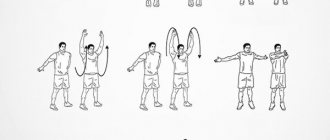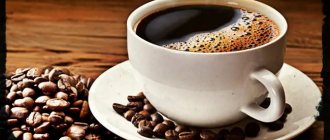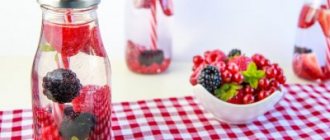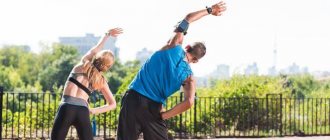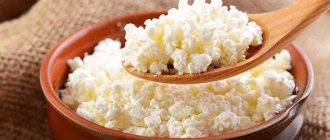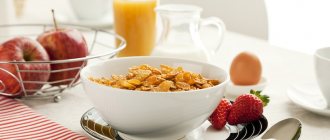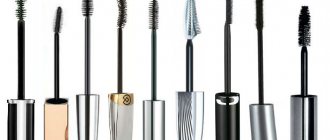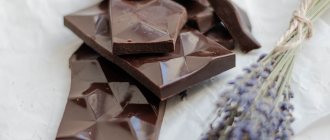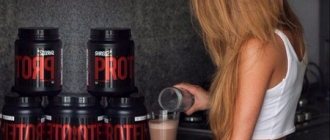Energy drinks before workout
To motivate themselves to train, increase performance, strength potential and endurance, bodybuilders take energy sports supplements.
These specialty drinks are often called pre-workouts because they are consumed before a workout. The high popularity of energy drinks prompts many bodybuilders to look for information about the effectiveness of these supplements, possible side effects, and what ingredients can be used to prepare an energy drink at home. The action of pre-workout complexes is based on the activity of the components contained in the product. Supplements are mainly produced based on creatine, amino acids, caffeine, vitamins, arginine, and guarana. Each component has its own specific effect. Guarana and caffeine are powerful stimulants of the nervous system. Arginine and amino acids are ingredients that increase endurance and performance during training. There are certain restrictions on the use of energy drinks. If you regularly abuse caffeine and other stimulants, it is dangerous for the heart and leads to the development of related problems.
How to take energy drinks
The rules for using the complex depend on the specific brand, but there are some general rules. Most energy drinks are drunk before training (15-20 minutes before). To enhance the effect obtained from the sports supplement, some bodybuilders take drinks along with L-carnitine, BCAA amino acids, and vitamin and mineral complexes.
Experienced bodybuilders recommend drinking energy drinks not every day, but only when they train. The supplement can be used with various sports nutrition, but not with other pre-workout complexes of a similar spectrum of action. If you take energy drink together with other fat burners, it will create a health hazard. When using pre-workout supplements, you should avoid coffee and other stimulating drinks. Large doses of caffeine negatively affect the heart and cause insomnia.
Homemade energy drink recipes
Ready-made energy complexes, especially high-quality ones, are quite expensive. However, using fairly inexpensive ingredients, you can prepare a pre-workout at home. Such homemade energy drinks are, of course, inferior to store-bought ones, but they help achieve tangible results. They invigorate, increase motivation and productivity.
The classic pre-workout formula includes caffeine and is prepared as follows:
- Brew three bags of regular black tea without any additives and leave to brew for a while;
- pour the resulting tea leaves into a container with a volume of half a liter;
- add cold water to the remaining volume so that the dishes are almost full;
- add 20 pieces of ascorbic acid to the resulting mixture (one tablet contains 50 mg of vitamin C);
- Stir the resulting drink until ascorbic acid is completely dissolved, and then place the additive in the refrigerator.
The energy drink, which is quite simple in composition, has a good effect on the body. Tea contains not only caffeine, but also other tonic substances. Ascorbic acid suppresses catabolic processes well. Water replenishes the fluid expended during training.
There is another option for preparing energy drinks, but without using caffeine-containing components:
- 500 ml of water is poured into the container;
- dissolve a few tablespoons of natural honey in the liquid;
- add a little lemon juice and 0.2 grams of succinic acid;
- A small amount of alcohol tincture is added to the drink.
This pre-workout complex prevents catabolism thanks to its vitamin C content, motivates and improves performance in classes due to the inclusion of adaptogens, and honey with succinic acid energizes.
Both complexes can be drunk not only before, but also during training.
What to eat before training: 10 tips from Brodude
Before we talk about the pre-workout menu, let's discuss what if you don't eat at all? People who want to lose weight often train on an empty stomach. If you want to lose weight, it makes sense to do about 20 minutes of intense aerobic exercise on an empty stomach, and this will be more effective than doing cardio for an hour after eating. At least that's what is commonly believed.
Indeed, there is evidence that training on an empty stomach increases fat oxidation and allows fat to be converted into energy faster. But more fat consumption does not necessarily mean more weight loss, since fat is also taken from muscle cells, and not just from subcutaneous fat. And when the exercise is over, the unoxidized fat returns to the adipose tissue. So all these benefits of training on an empty stomach are not obvious. To make matters worse, the precious protein from your muscles is also used as fuel. Research published in the American Journal of Applied Physiology found that nitrogen losses from protein breakdown double when exercising on an empty stomach. This is bad news for those who want to build muscle.
That's why, man, you need to eat before training. Research has found that consuming carbohydrates before exercise slows down fatigue and improves endurance and physical performance. This happens because carbohydrates increase blood glucose levels and make muscles more active. About 70% of the energy you get before exercise should come from carbohydrates, but you should choose foods with a low glycemic index: oatmeal, vegetables, sweet potatoes, rather than chocolates and cookies. Protein is also very important to keep your muscles from breaking down during your workout. Fats take the longest to digest, so before training you should consume as little fat as possible.
The biggest challenge is knowing how much you can eat before training. You will understand this from your own experience. Some dudes can eat a full three-course meal an hour before heading to the gym and work out like crazy, while other guys with more sensitive bellies eat three to four hours before working out. In general, if you plan to eat a substantial meal of 500-600 calories, do it three hours in advance. A small snack of 300 calories or less can be eaten an hour before your workout. Experiment with portion sizes and timing to find what works best for you.
If a long workout is coming up, you need to add carbohydrates to the menu. If you plan to do strength training, you need to add more protein. Here are our suggestions.
The role of pre-workout nutrition for weight loss
The goal of your pre-workout meal is to give your body the energy it needs so you can perform at your best without feeling heavy in your stomach. If you don't eat right, you may become fatigued quickly, which will affect the intensity and duration of your workout. It also leaves you hungry after you've finished your workout, and lack of energy can burn muscle rather than fat. Active men and women can safely lose weight by consuming 1,500 to 1,800 calories per day; the more you weigh, the fewer calories. When losing weight, meals should be frequent , at least 5-6 times a day, without waiting for the feeling of hunger.
Fasting slows down your metabolism at a time when you need to speed it up.
Oatmeal, sir
Recipe: ½ cup whole oatmeal and 1 scoop protein powder. When to eat: before endurance exercise, one to two hours before training. Calories: 420, proteins: 33 g; fats: 7 g; carbohydrates: 57 g; sugar: 2 g.
Oatmeal is a great low glycemic index cereal that is less processed than other cereals. Whole oatmeal will be tougher and take a little longer to cook, but it's worth it.
Omelette with vegetables
Recipe: 2 whole eggs, 2 egg whites, peppers, onions, mushrooms; grapefruit/oatmeal. When to eat: before exercises to develop muscle mass, one to two hours before training. For longer workouts or cardio, add grapefruit or half a glass of rolled oats to your menu. Calories: 321; proteins: 26 g; fat: 18 g; carbohydrates: 13 g; sugar: 6.47 g.
A classic omelet is a great option for those who head to the gym right after breakfast. Eggs have the most protein of any common breakfast food. Egg protein is natural and therefore very well absorbed by the body. Great choice.
Pre-workout food for bulking
Proteins are the building blocks for muscle building. Their natural sources are protein foods: chicken, turkey, egg whites. To speed up muscle growth before training, it is enough to consume from 20 to 40 grams of protein, which is equivalent to 70-135 grams of boiled veal or 130-270 grams of cottage cheese with 9 percent fat content.
The portion of carbohydrates should also be increased to 40-70 grams. But fats should still occupy no more than 10% of the diet, and their consumption should be postponed to another time. Fatty foods not only take a long time to digest, but also interfere with the absorption of other nutrients, so they should absolutely not be taken before training.
30 minutes before a workout aimed at gaining muscle mass, athletes are advised to additionally eat one large apple or pear and wash it down with a protein shake, preferably a whey shake.
Turkey cabbage rolls
Recipe: 100 g turkey fillet, 1 cabbage leaf, purple onion, red pepper, small tomatoes and a teaspoon of mustard. Spread the mustard on the cabbage leaf and wrap it with the rest of the ingredients. When to eat: before training for muscle development, half an hour to an hour before training. If you also plan to do cardio, you can eat porridge instead of cabbage. Calories: 184; proteins: 28 g; fats: 3 g; carbohydrates: 13 g; sugar: 6 g.
Turkey is an excellent source of protein that is easy to digest and does not interfere with digestion. This variation of the classic cabbage roll, which is lower in calories and carbs, is great for losing weight and building muscle. Ideal for those avoiding gluten.
How to eat before a workout to lose weight
To lose weight, you need to properly organize your diet. You should not fast, especially before training. The body must have enough strength to work in the gym or when doing exercises at home.
Meals before training are organized taking into account several rules:
- Food should be light, mostly carbohydrates. Porridge is ideal for this.
- The last meal should take place 2 hours before training.
- You are allowed to drink kefir or eat an apple 30 minutes before.
To start the fat burning process, it is recommended to drink a cup of coffee before training. The drink will give you a boost of energy and help jump-start your metabolism.
What is suitable as a pre-workout meal for weight loss:
- porridge with water or milk;
- fruit and vegetable salads;
- breads.
Be sure to count calories - they should not be more than 200 for women and 300 for men.
Before training, take special supplements - thermogenic fat burners. Their action is aimed at increasing body temperature, thereby triggering fat burning mechanisms. What supplements can you buy:
- Nutrex Lipo-6 Black Ultra Concentrate. The active substance is caffeine. This thermogenic helps burn fat, increases endurance and improves mental focus.
- Nutrex Lipo-6X. The basis of this supplement is a unique multi-stage technology, thanks to which the substances are delivered gradually. This leads to rapid weight loss, increased physical strength and endurance.
- Olimp Thermo Speed Extreme. Suitable for those who want to lose weight and gain muscle mass. The supplement acts in several directions, helping the body withstand heavy loads.
Weight loss supplements are not a mandatory part of losing weight. But with them, the fat burning process will go much faster.
Return to article content
Post-workout nutrition to burn fat
After training, you should not eat carbohydrates. This is due to the fact that during physical activity and within 2 hours after it, the body launches an active fat burning mechanism, which is necessary to replenish lost energy. If you eat any carbohydrate product, the production of glycogen will begin thanks to carbohydrates, and not fat reserves.
After classes you need proteins. They help muscles work, maintain the beauty and tone of muscles. Thanks to protein foods, you can lose weight and gain a sculpted figure.
What can you eat after training:
- low-fat cottage cheese without additives;
- lean beef;
- chicken breast;
- egg whites;
- rabbit meat;
- lean fish.
You can always have a protein bar on hand that will satisfy your hunger and help overcome fatigue. For example:
- Power System Big Block 50%. A high-quality protein bar containing 50 g. squirrel. Ideal for a snack.
- VP Laboratory 40% High Protein. The composition contains 40 g. protein and only 18 grams. carbohydrates. Great for people who are losing weight.
- 32 Protein from Ironman. 32% consists of protein. It tastes good.
Special attention is paid to nutrition after training. It is important not to overeat and not exceed the calorie limit. It is important to remember the rules of fractional meals - often and in small portions.
Return to article content
Classic bodybuilder lunch
Recipe: 150 g baked chicken, sweet potatoes and broccoli. When to eat: before training to build muscle mass, two to three hours before training. Calories: 368, proteins: 59 g; fats: 9 g; carbohydrates: 37 g; sugar: 11 g.
Fitness models and athletes regularly eat this dish, and for good reason. Every ingredient is high quality. Lean poultry contains large amounts of protein, sweet potatoes contain complex carbohydrates and antioxidants, and broccoli contains a mountain of vitamins, minerals and other substances. This food has everything your body needs. This is a complete meal, so you shouldn't eat it right before your workout.
Cottage cheese with fruit
Recipe: ½ pack of cottage cheese and ½ cup of fresh berries or melon. For endurance - banana. When to eat: before endurance training, half an hour to an hour before training. Calories: 117; proteins: 14 g; fats: 0.1 g; carbohydrates: 13 g; sugar: 6 g.
Cottage cheese does not contain lactose (this is rare for dairy products) and is an excellent source of protein. Blueberries and melon are rich in vitamins, minerals and antioxidants essential for your workout. If you need more energy for greater endurance, eat a banana. Bananas are rich in carbohydrates and contain potassium, which is essential for the proper functioning of nerves and muscles. Potassium is important for long, intense workouts, especially if you train in hot weather. This low-calorie, easy-to-digest snack fills the gap between lunch and your workout.
Nutrition before aerobic training
For this type of load, the main thing is to stock up on carbohydrates.
In the process of cardio training, glycogen is consumed first, and then fats are burned. If the body does not have enough glucose, the metabolism slows down significantly, and accordingly, the productivity of exercise decreases.
In this case we are talking about complex carbohydrates. Porridge, vegetables, bran bread, fruits and juices are good options. It is also necessary to include protein in the diet: chicken, cottage cheese, fermented milk products.
Features of nutrition during cardio training depending on the time of its implementation:
- Morning workout. Half an hour before class, you can eat an egg, a piece of cheese or a small portion of low-fat cottage cheese and freshly squeezed juice.
- Daytime training is carried out 2-3 hours after eating. Lunch is a full meal. Only fatty foods and fast carbohydrates are excluded.
- Before training in the evening, it is important not to overload the body. Porridge or other slow carbohydrates are ideal.
Homemade Protein Bars
Recipe: ½ cup vanilla protein powder, ¼ cup coconut flakes, ¼ cup coconut flour, ¼ cup milk, 30g melted dark chocolate. Mix protein powder and coconut flour with milk and form into bars. Melt the chocolate in a water bath. Once melted, dip the bars into the chocolate and place in the refrigerator for 30-45 minutes. Or here's another recipe. When to eat: before muscle building exercises, half an hour to an hour before training. Calories: 212; proteins: 17 g; fat: 13 g; carbohydrates: 9 g; sugar: 3 g.
A very convenient pre-workout snack. But be careful: they can do more harm than good. You need to look at the composition very carefully and be sure that the bar contains high-quality protein and little sugar. For intense, long-lasting workouts, choose high-carb energy bars or natural bars made from whole ingredients. For muscle-building workouts, choose protein bars that contain at least 15 grams of protein. If you want something delicious, make it yourself. Coconut and protein powder are delicious and easy to turn into bars. Coconuts contain heart-healthy medium chain triglycerides, which can help you lose weight.
Yogurt with berries
Recipe: A serving of low-fat Greek yogurt and ½ cup of blueberries. When to eat: Before muscle-building workouts. For stamina, add a banana. Eat half an hour to an hour before training. Calories: 173; proteins: 14 g; fats: 0.5 g; carbohydrates: 28 g; sugar: 22 g.
Greek yogurt is made from regular yogurt with the whey removed, resulting in a thicker, creamier product. Compared to regular yogurt, Greek yogurt is twice as rich in protein and contains less carbohydrates and sodium. All yogurts are an excellent source of calcium. Plain, low-fat variations of Greek yogurt and regular yogurt contain about the same amount of calories and beneficial bacteria, although flavored yogurt also adds sugar, which is much healthier to replace with fruit.
Nutrition before strength training
During strength training, you need to provide yourself with a sufficient amount of not only carbohydrates, but also proteins, which are important for the formation and restoration of muscle fibers.
Fats should be excluded. They slow down the digestion of food, which can cause stomach discomfort during exercise. You need to eat at least 2 hours in advance.
We recommend reading: How to pump up your butt at home quickly and effectively in a week
An approximate set of products from which you can create a menu for meals before strength training:
- lean meats and fish;
- potatoes, rice, pasta as a side dish;
- eggs, omelet;
- porridge (especially buckwheat and oatmeal);
- cottage cheese, cheese.
Protein shake with coffee
Recipe: 1 cup of iced coffee and 1 serving of protein shake. When to drink: before training to build muscle mass, for endurance, you can add a bowl of oatmeal to the menu. Consume half an hour before training. Calories: 150; proteins: 26 g; fats: 2 g; carbohydrates: 7 g; sugar: 2 g.
This delicious smoothie will give you energy. Research shows that caffeine is a powerful energy booster that helps athletes perform better and work out longer. It improves speed and strength when taken before competition. Caffeine affects both short and long-term exercise, and if you drink water, you won't face any negative consequences. If you want to be stronger, caffeine is of little use. This protein shake with coffee can be drunk in minutes or even during your workout. Liquids are digested much faster, so don't worry: your stomach will be fine.
Fitness nutrition before workout
The main rule of fitness nutrition is a large amount of liquid. The classic norm is one and a half to two liters a day, while, of course, coffee and sweet drinks: juices from a package, sparkling water, cocktails, etc., do not count, since they do not quench thirst, but only provoke it.
It is important to drink water before, during and after exercise because it is essential for your body to absorb and process nutrients. Even mild dehydration can slow down your metabolic rate, meaning you won't burn calories as quickly.
Almond oil
Recipe: 2 tbsp. l. almond butter and celery. When to eat: Before a muscle-building workout. Dip celery in oil and eat it an hour or two before training. Calories: 206; proteins: 7 g; fat: 18 g; carbohydrates: 8 g; sugar: 3 g.
Athletes love nut butters because they are high in protein and healthy fats. Almond oil contains vitamin E, potassium, magnesium, iron, calcium and phosphorus and is considered a very healthy food. It is very difficult to find in stores because it is not produced much, and salt, sugar and fat are not added to it. Remember that peanuts are not a real nut, but rather a vegetable, so they are much more harmful to your belly. Before training, simply leave a jar of almond butter at work, home or in the car and eat it with celery. The taste is refreshing, but it’s easy to overeat. Be careful.
What to eat before training while cutting
Drying is the most difficult period for an athlete. At this time, fats and carbohydrates are removed from the diet as much as possible. Ideally, the diet contains exclusively proteins and fiber. The best source of protein is boiled eggs, fiber - non-starchy vegetables: tomatoes, cucumbers, cabbage. On such a diet, blood sugar levels are minimal, and the body uses fatty acids rather than glycogen as an energy source.
A low-carbohydrate diet is a serious stress for the body. Therefore, despite the rapid weight loss, cutting cannot be considered as a long-term diet. Her task is to quickly get the body into ideal shape before competitions.
Nut mix
Recipe: 1 cup raw unsalted nuts (almonds, seeds, cashews, hazelnuts), 1 tbsp. l. olive oil, ¼ tsp. cinnamon, cayenne pepper, chili and sea salt, 1 tsp. maple syrup. Preheat the oven and lightly toast the nuts for 5-10 minutes. Mix butter, spices and syrup and add roasted nuts. Return them to the oven and bake for another 5-10 minutes, don’t forget to line them with baking paper. When to eat: Before training to build muscle mass, add dried fruit for endurance. Eat an hour or two before training. Calories: 546; proteins: 20 g; fats: 60 g; carbohydrates: 23 g; sugar: 7 g.
Best Pre-Workout Foods
Pre-workout nutrition, as well as recovery and the workout itself, is key to achieving muscle growth or weight loss. We present to you the 11 most important and healthy foods that you need to include in your diet before working out in the gym.
Before you begin a regular 1-2 hour workout, whether you're jogging, lifting weights, or pedaling an exercise bike, you need to ensure your body is properly energized. Foods high in protein and carbohydrates have a good effect on muscle function and contribute to their recovery after training.
How much can you eat before training if you are losing weight?
It is not recommended to eat too much immediately before exercise to avoid a feeling of heaviness in the stomach and belching. A light, bulky snack will help you replenish your energy reserves and feel comfortable in the gym, even during active exercise.
Breakfast, lunch and dinner are eaten in the accepted volumes without overeating. Too much food will make it difficult to digest, and unspent energy will again result in excess weight. Therefore, those who are used to eating a lot will still have to limit themselves in food.
It would not be superfluous to consult with a nutritionist who will calculate for you a competent menu for weight loss, taking into account physical activity and meal times. All you have to do is stick to the plan and not break the routine.
What foods should you eat before training?
Include the following healthy foods in your diet on a regular basis before going to the gym.
Bananas
Bananas contain a lot of active carbohydrates, which supply the body with the necessary energy for training. The potassium contained in bananas is essential for the normal functioning of muscle and nerve tissues.
Bananas
For those people who are used to starting their workout early in the morning, skipping breakfast: “Please remember to eat a banana before exercise, and half an hour after exercise, have breakfast to replenish the protein supply necessary for muscle recovery and growth.”
Oatmeal
Oatmeal contains a lot of fiber, which helps replenish carbohydrates in the body. This way you can ensure that you are fully charged for your workout. If good old oatmeal isn't your thing, there are plenty of pre-bed oatmeal recipes online that are packed with fiber and protein.
Oatmeal
Oatmeal with berries and fiber
- Mix Hercules with berries and pour boiling water
- Add honey, Siberian fiber and kefir
- Mix everything and serve
- Hercules - 30 gr.
- Currants - 10 gr.
- Cranberries - 10 gr.
- Cherry - 10 gr.
- Kefir 1% – 50 gr.
- Siberian fiber - 3 gr.
- Honey - 3 gr.
- Water - 20 gr.
Caffeine
As practice shows, those who regularly drink coffee can exercise longer. Caffeine relieves fatigue and promotes more intense fat burning. Many athletes add a little caffeine to their morning pre-workout shake.
Caffeine
High Protein Fruit Cocktail
This is a really great pre-workout drink because it contains a lot of healthy, fast-digesting protein and a combination of simple and complex carbohydrates. The first ones begin to act after 15-20 minutes of training, and the second ones - after half an hour. Together they provide a continuous flow of energy throughout a standard workout. You can read more about the benefits of protein shakes here.
Fruit and protein smoothie
Recipes for fruit smoothies containing proteins can be found on the Internet. Here are some of them:
- “Mojito”: 150 g milk, green apple and kiwi (50 g each), mint, honey, ice
- “Vitamin”: 150 g low-fat yogurt, 100 g strawberries, 50 g currants, honey
- “Pineapple”: 50 g pineapple, 150 g milk, 50 g milk, 50 g cottage cheese, a pinch of coconut, a pinch of cinnamon, tbsp. l. jam
- “Caribbean Party”: 150 g coconut milk, a pinch of coconut flakes, pineapple and papaya 50 g each
- “Strawberry pleasure”: 150 g of natural low-fat yoghurt, 100 g of frozen strawberries, 1 kiwi, honey
Chickpeas (chickpeas)
This is a super easy pre-workout snack that doesn't require any cooking. Just pour a quarter or a third of a glass of chickpeas and moisten it with lemon juice for taste. A quarter cup of chickpeas contains 10 grams of protein, 30 grams of carbohydrates and about 9 grams of fiber.
Chickpeas (chickpeas)
Egg white
Since the yolk of an egg contains a lot of fat, which takes a long time to digest and will make you feel heavy during a workout, the best option is egg whites . One egg white contains approximately 4 g of protein and no fat.
Egg white and yolk
Dried fruits
If you only have a couple of minutes before your workout, dried fruits are the best pre-workout snack. They will provide the body with the energy contained in the fast carbohydrates of dried fruits. In this case, there will be no heaviness in the stomach during exercise.
Dried berries, dried apricots and pineapple are best suited. Before training, just a quarter glass is enough.
Dried fruits
Whole grains
Whole grains of quinoa and brown rice provide energy ( glycogen ) that will be released gradually during exercise. You can add a little jam to them or, as shown in the picture for the recipe, Greek yogurt, pistachios and honey to get the required supply of fast carbohydrates.
Whole grains
Chicken and brown rice
If your workout is planned for the afternoon or after dinner, you need to eat something that will add energy and contain a minimum of fat. The complex carbohydrates contained in rice will support the body's energy reserves, and the proteins contained in chicken meat will promote muscle recovery and growth.
Chicken and brown rice
Instead of rice, you can use sweet potatoes, quinoa or other whole grains or starchy vegetables. The main thing is to avoid foods that take a long time to digest. They may cause discomfort during exercise.
Greek yogurt
This type of yogurt contains almost 2 times more protein than regular yogurt and half the amount of sugar. Except in cases where there is lactose intolerance, this product will replenish the body's energy charge, and during training there will be no feeling of heaviness in the stomach. As an alternative, you can use cottage cheese, which contains about the same amount of protein.
Greek yogurt
Peruvian maca
Peruvian maca root is very popular because it makes the body strong and resilient, not to mention its other beneficial properties. Most South American football players consume the root of this plant before matches in order to use the maximum capabilities of the body. It can be added to any product: from oatmeal to smoothies and yogurt.
Peruvian maca
People who want to lose excess fat exercise on an empty stomach , and this supposedly promotes even more intense burning of fat tissue. However, in fact, the body in such a state will experience severe stress, and may simply go into a “waiting” mode to save energy; in this state, the body quickly stores fat reserves, and proteins and carbohydrates will be used as an energy source, but not fats !
It should be remembered that between meals and training there should be a time interval of 45 minutes to an hour, so as not to disturb digestion and not experience heaviness in the stomach.
Features of the main meal and snacks before training
The athlete must eat his portion of food 2-3 hours before training so that the body has time to digest the food and convert it into energy.
Light foods such as freshly squeezed juice, kefir or herbs can be consumed 1-1.5 hours before classes. It is better not to eat later, as abdominal discomfort may appear and fats will not be burned.
The longer the classes last, the more satisfying the meal should be. In the first half of the day, the portion of food may be larger. If the workout is planned for the evening, then you need to eat kefir or fresh juice, a minimum portion of meat and vegetables.
Before fitness and cardio
Before aerobic exercise, you need to recharge with carbohydrates, since during exercise, glucose, glycogen, and then fat are used up first.
When glycogen concentration decreases, metabolism slows down and fatigue quickly sets in. You can get them from a smoothie, fresh juice, milkshake or a portion of fruit. After such “charging”, endurance increases and fats are burned faster.
Before class, you can eat buckwheat or oatmeal, a light fruit or vegetable salad, diet bread or cookies.
Don't forget about the proteins found in fish, meat, eggs or kefir. They accelerate the formation of new muscle cells.
If you don’t have time to prepare a dish and work out in the morning, then 40 minutes before the gym you can eat 1 green apple, a portion of cottage cheese or drink 220 ml of green tea.
Before strength training in the gym
Before intense exercise in the gym, you can eat steamed steak with boiled potatoes, boiled meat with rice porridge, whole grain toast and oatmeal, soup or cottage cheese.
If you want to increase muscle mass, then 60 minutes before training, eat 1 apple or pear, a handful of strawberries. Before strength training, you can take whey protein (30 mg/1 kg).
A cup of black natural coffee before training will charge you with energy and speed up fat burning. Caffeine acts for 3 hours.
To satisfy extreme hunger before class, drink 220 ml of skim milk.
You may also be interested in: Gym Workout Nutrition for Women for Weight Loss
